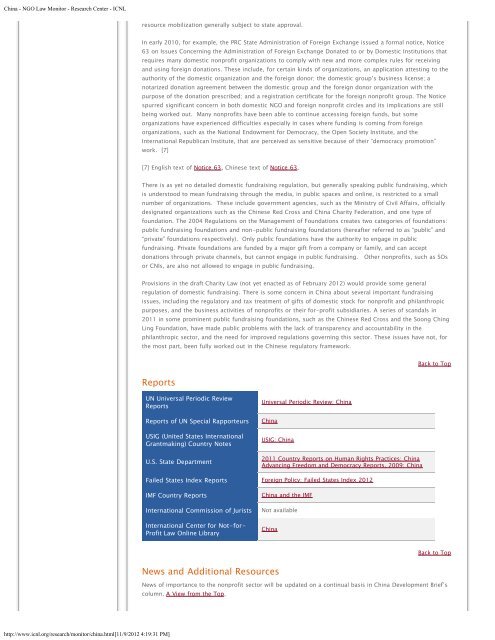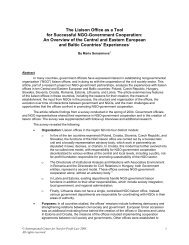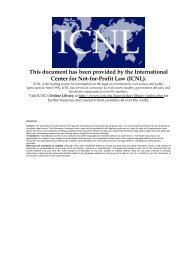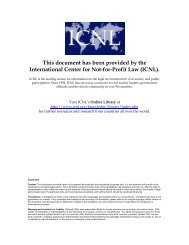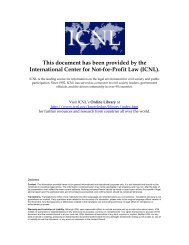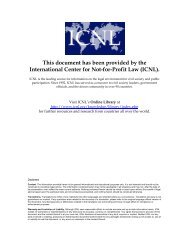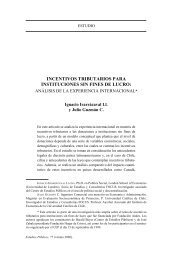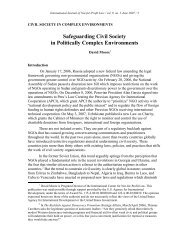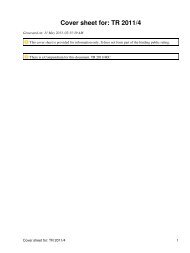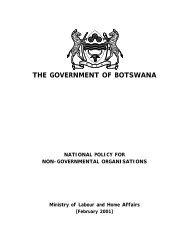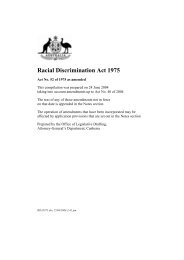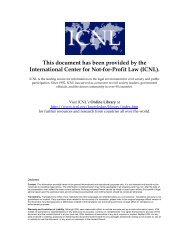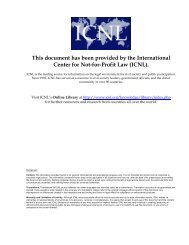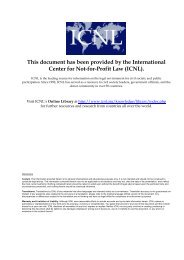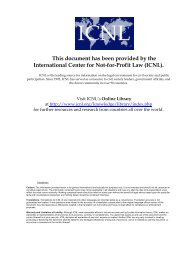NGO Law Monitor: China RESEARCH CENTER - The International ...
NGO Law Monitor: China RESEARCH CENTER - The International ...
NGO Law Monitor: China RESEARCH CENTER - The International ...
Create successful ePaper yourself
Turn your PDF publications into a flip-book with our unique Google optimized e-Paper software.
<strong>China</strong> - <strong>NGO</strong> <strong>Law</strong> <strong>Monitor</strong> - Research Center - ICNL<br />
http://www.icnl.org/research/monitor/china.html[11/9/2012 4:19:31 PM]<br />
resource mobilization generally subject to state approval.<br />
In early 2010, for example, the PRC State Administration of Foreign Exchange issued a formal notice, Notice<br />
63 on Issues Concerning the Administration of Foreign Exchange Donated to or by Domestic Institutions that<br />
requires many domestic nonprofit organizations to comply with new and more complex rules for receiving<br />
and using foreign donations. <strong>The</strong>se include, for certain kinds of organizations, an application attesting to the<br />
authority of the domestic organization and the foreign donor; the domestic group’s business license; a<br />
notarized donation agreement between the domestic group and the foreign donor organization with the<br />
purpose of the donation prescribed; and a registration certificate for the foreign nonprofit group. <strong>The</strong> Notice<br />
spurred significant concern in both domestic <strong>NGO</strong> and foreign nonprofit circles and its implications are still<br />
being worked out. Many nonprofits have been able to continue accessing foreign funds, but some<br />
organizations have experienced difficulties especially in cases where funding is coming from foreign<br />
organizations, such as the National Endowment for Democracy, the Open Society Institute, and the<br />
<strong>International</strong> Republican Institute, that are perceived as sensitive because of their “democracy promotion”<br />
work. [7]<br />
[7] English text of Notice 63, Chinese text of Notice 63.<br />
<strong>The</strong>re is as yet no detailed domestic fundraising regulation, but generally speaking public fundraising, which<br />
is understood to mean fundraising through the media, in public spaces and online, is restricted to a small<br />
number of organizations. <strong>The</strong>se include government agencies, such as the Ministry of Civil Affairs, officially<br />
designated organizations such as the Chinese Red Cross and <strong>China</strong> Charity Federation, and one type of<br />
foundation. <strong>The</strong> 2004 Regulations on the Management of Foundations creates two categories of foundations:<br />
public fundraising foundations and non-public fundraising foundations (hereafter referred to as “public” and<br />
“private” foundations respectively). Only public foundations have the authority to engage in public<br />
fundraising. Private foundations are funded by a major gift from a company or family, and can accept<br />
donations through private channels, but cannot engage in public fundraising. Other nonprofits, such as SOs<br />
or CNIs, are also not allowed to engage in public fundraising.<br />
Provisions in the draft Charity <strong>Law</strong> (not yet enacted as of February 2012) would provide some general<br />
regulation of domestic fundraising. <strong>The</strong>re is some concern in <strong>China</strong> about several important fundraising<br />
issues, including the regulatory and tax treatment of gifts of domestic stock for nonprofit and philanthropic<br />
purposes, and the business activities of nonprofits or their for-profit subsidiaries. A series of scandals in<br />
2011 in some prominent public fundraising foundations, such as the Chinese Red Cross and the Soong Ching<br />
Ling Foundation, have made public problems with the lack of transparency and accountability in the<br />
philanthropic sector, and the need for improved regulations governing this sector. <strong>The</strong>se issues have not, for<br />
the most part, been fully worked out in the Chinese regulatory framework.<br />
Reports<br />
UN Universal Periodic Review<br />
Reports<br />
Reports of UN Special Rapporteurs <strong>China</strong><br />
USIG (United States <strong>International</strong><br />
Grantmaking) Country Notes<br />
U.S. State Department<br />
Universal Periodic Review: <strong>China</strong><br />
USIG: <strong>China</strong><br />
2011 Country Reports on Human Rights Practices: <strong>China</strong><br />
Advancing Freedom and Democracy Reports, 2009: <strong>China</strong><br />
Failed States Index Reports Foreign Policy: Failed States Index 2012<br />
IMF Country Reports <strong>China</strong> and the IMF<br />
<strong>International</strong> Commission of Jurists Not available<br />
<strong>International</strong> Center for Not-for-<br />
Profit <strong>Law</strong> Online Library<br />
<strong>China</strong><br />
News and Additional Resources<br />
Back to Top<br />
Back to Top<br />
News of importance to the nonprofit sector will be updated on a continual basis in <strong>China</strong> Development Brief’s<br />
column, A View from the Top.


